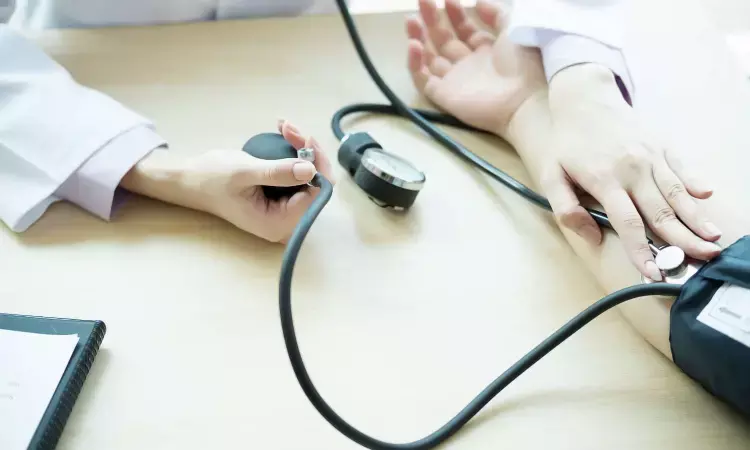- Home
- Medical news & Guidelines
- Anesthesiology
- Cardiology and CTVS
- Critical Care
- Dentistry
- Dermatology
- Diabetes and Endocrinology
- ENT
- Gastroenterology
- Medicine
- Nephrology
- Neurology
- Obstretics-Gynaecology
- Oncology
- Ophthalmology
- Orthopaedics
- Pediatrics-Neonatology
- Psychiatry
- Pulmonology
- Radiology
- Surgery
- Urology
- Laboratory Medicine
- Diet
- Nursing
- Paramedical
- Physiotherapy
- Health news
- Fact Check
- Bone Health Fact Check
- Brain Health Fact Check
- Cancer Related Fact Check
- Child Care Fact Check
- Dental and oral health fact check
- Diabetes and metabolic health fact check
- Diet and Nutrition Fact Check
- Eye and ENT Care Fact Check
- Fitness fact check
- Gut health fact check
- Heart health fact check
- Kidney health fact check
- Medical education fact check
- Men's health fact check
- Respiratory fact check
- Skin and hair care fact check
- Vaccine and Immunization fact check
- Women's health fact check
- AYUSH
- State News
- Andaman and Nicobar Islands
- Andhra Pradesh
- Arunachal Pradesh
- Assam
- Bihar
- Chandigarh
- Chattisgarh
- Dadra and Nagar Haveli
- Daman and Diu
- Delhi
- Goa
- Gujarat
- Haryana
- Himachal Pradesh
- Jammu & Kashmir
- Jharkhand
- Karnataka
- Kerala
- Ladakh
- Lakshadweep
- Madhya Pradesh
- Maharashtra
- Manipur
- Meghalaya
- Mizoram
- Nagaland
- Odisha
- Puducherry
- Punjab
- Rajasthan
- Sikkim
- Tamil Nadu
- Telangana
- Tripura
- Uttar Pradesh
- Uttrakhand
- West Bengal
- Medical Education
- Industry
Road traffic noise can increase risk of high blood pressure, study finds

China: A recent study published in JACC: Advances has revealed that long-term exposure to road traffic noise can increase the risk of hypertension.
Researchers found that long-term exposure to air pollution and road traffic noise was associated with an elevated risk of developing incident primary hypertension, and air pollution and traffic noise exposure was linked to a higher likelihood of hypertension.
“We were a little surprised that the association between road traffic noise and hypertension was robust even after adjustment for air pollution,” said Jing Huang, assistant professor in the Department of Occupational and Environmental Health Sciences in the School of Public Health at Peking University in Beijing, China, and lead author of the study.
Previous studies have shown a connection between noisy road traffic and an increased risk of hypertension. However, strong evidence was lacking, and it was unclear whether noise or air pollution played a bigger role.
Previous studies of the issue were cross-sectional, meaning they showed that traffic noise and hypertension were linked, but failed to show a causal relationship. For the new paper, researchers conducted a prospective study using UK Biobank data examining health outcomes over time.
Researchers analyzed data from more than 240,000 people (aged 40 to 69 years) who started out without hypertension. They estimated road traffic noise based on residential address and the Common Noise Assessment Method, a European modeling tool.
Using follow-up data over a median 8.1 years, they looked at how many people developed hypertension. Not only did they find that people living near road traffic noise were more likely to develop hypertension, they also found that risk increased in tandem with the noise “dose.”
These associations held true even when researchers adjusted for exposure to fine particles and nitrogen dioxide. However, people who had high exposure to both traffic noise and air pollution had the highest hypertension risk, showing that air pollution plays a role as well.
“Road traffic noise and traffic-related air pollution coexist around us,” Huang said. “It is essential to explore the independent effects of road traffic noise, rather than the total environment.”
The findings can support public health measures because they confirm that exposure to road traffic noise is harmful to our blood pressure, she said. Policymaking may alleviate the adverse impacts of road traffic noise as a societal effort, such as setting stricter noise guideline and enforcement, improving road conditions and urban design, and investing advanced technology on quieter vehicles.
“To date, this is the first large-sized prospective study directly addressing the effect of road traffic noise on the incidence of newly-diagnosed hypertension,” said Jiandong Zhang, cardiovascular disease fellow in the division of cardiology at the University of North Carolina at Chapel Hill, and author of the accompanying editorial comment. “The data demonstrated in this article provides a higher quality of evidence to justify the potential to modify road traffic noise and air pollution from both individual and societal levels in improving cardiovascular health.”
As a follow-up, Huang said field studies are underway to better understand the pathophysiological mechanisms through which road noise affects hypertension.
Reference:
Jing Huang, Teng Yang, John Gulliver, Anna L. Hansell, Mohammad Mamouei, Yutong Samuel Cai, Kazem Rahimi, Road Traffic Noise and Incidence of Primary Hypertension: A Prospective Analysis in UK Biobank, JACC: Advances, 2023, https://doi.org/10.1016/j.jacadv.2023.100262.
Dr Kamal Kant Kohli-MBBS, DTCD- a chest specialist with more than 30 years of practice and a flair for writing clinical articles, Dr Kamal Kant Kohli joined Medical Dialogues as a Chief Editor of Medical News. Besides writing articles, as an editor, he proofreads and verifies all the medical content published on Medical Dialogues including those coming from journals, studies,medical conferences,guidelines etc. Email: drkohli@medicaldialogues.in. Contact no. 011-43720751


